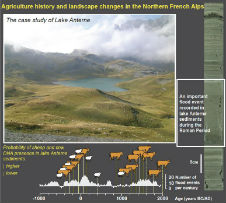Agriculture History in the French Alps
Charline Giguet-Covex, Kevin Walsh, Camilla Speller

25 September 2015
5.45pm-6.05pmKing's Manor, K159 (map)
FREE admission
No booking requiredNo wheelchair access
Event details
Due to their unique biological and geological resources, mountains have attracted humans since prehistoric times, despite their sensitivity to environmental and climatic changes. Few studies, however, have investigated the detailed history and dynamic of alpine agro-pastoral activities or their impacts on landscapes (plant cover and erosion). This is largely due to the lack of suitable proxies for human activities in these environments.
To address this challenge, we present here results from an innovative tool, ancient DNA applied to lake sediment archives. These archives are distributed across an elevation gradient in the North French Alps (lake La Thuile at 874 m and Anterne at 2063 m a.s.l.) in order to investigate how human-climate-environment relations evolved in diversified environments but in a similar cultural area. The history of the last 3000 years is presented.
Main results show important pastoral activity during the Late Iron Age and Roman Period, as well as during the Medieval Period, with particular emphasis on sheep and cows. This activity triggered soil erosion during the Roman Period. However, at lower altitude, the main period of soil erosion is dated to the Early Middle Ages and is mainly triggered by arable agriculture (cereals and hemp).

